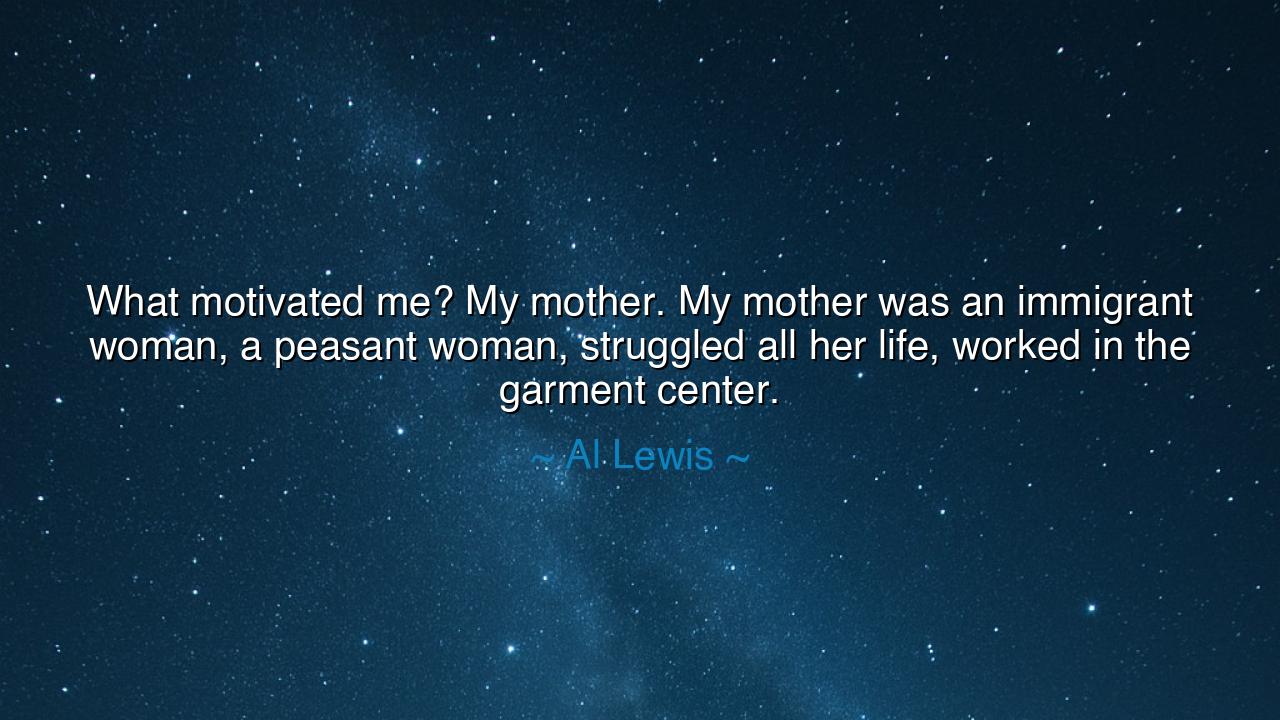
What motivated me? My mother. My mother was an immigrant woman, a
What motivated me? My mother. My mother was an immigrant woman, a peasant woman, struggled all her life, worked in the garment center.






The words of Al Lewis — “What motivated me? My mother. My mother was an immigrant woman, a peasant woman, struggled all her life, worked in the garment center.” — carry the echo of generations, the quiet roar of endurance, and the profound force of maternal influence. In these words, we glimpse the foundation of ambition not as a fleeting desire, but as a legacy of perseverance, forged in hardship and sustained by love. His mother’s life, marked by struggle and toil, became the compass that guided him — a living testament to the power of resilience, the dignity of labor, and the transformative force of maternal example.
To say that his mother motivated him is to recognize that true inspiration often lies not in fame, wealth, or opportunity, but in witnessing the courage of those who endure without complaint. She was an immigrant, a peasant, a worker in the crowded and demanding garment center — a life of long hours, scarcity, and unending effort. Yet in that ordinary struggle, she modeled a strength that transcends circumstance. The ancients understood this principle: the young are shaped not by comfort but by the virtue of those who come before them. The mother, who toiled with dignity despite hardship, becomes the first teacher of courage.
Her life, though humble in material terms, was heroic in spirit. The ancients revered such figures as exemplars of moral endurance. Consider Homeric mothers, who labored quietly to sustain their households while war raged beyond the walls. Or think of the mothers of Rome and Athens, whose guidance instilled honor, discipline, and ambition in their sons and daughters. Al Lewis’s reflection situates his mother in this timeless lineage: her sacrifices, her work, and her struggles were not merely survival, but a living curriculum of resilience and determination.
The garment center, where she labored, was not merely a workplace but a crucible of life. There, amidst the clatter of machines and the heat of long hours, she demonstrated diligence, patience, and endurance. Her example taught that achievement is not a gift but a product of persistence, that the dignity of labor is its own reward, and that one’s roots — humble though they may be — can nourish the growth of greatness. Al Lewis’s recognition of her influence reveals that motivation is often a reflection of admiration for those who endure and prevail.
History provides countless examples of individuals inspired by maternal struggle. Consider Golda Meir, whose early life in a Jewish immigrant family in Milwaukee instilled in her the resilience and pragmatism that would later shape her leadership of Israel. The hardship of her mother and family was the forge in which Meir’s character was tempered. Similarly, Lewis’s mother, though anonymous in the grand narrative of history, became a personal lodestar, guiding him toward purpose, ambition, and moral clarity.
There is also a profound lesson in immigrant perseverance within his words. Immigrant mothers, who arrive in foreign lands with little but hope, transform hardship into opportunity for their children. They teach, through example, that courage is action, and ambition is rooted in responsibility, not entitlement. In Lewis’s case, the struggles of his mother became a moral contract: her toil demanded not mere gratitude, but the realization of potential, the pursuit of dreams she could not fully claim for herself.
From this reflection, we glean a timeless truth: motivation is often born of love and admiration, not mere self-interest. To recognize the sacrifices of those who came before, to see in their endurance the path to one’s own achievements, is to honor them with effort and purpose. Al Lewis’s tribute reminds us that the ordinary acts of courage, the quiet labor, and the steadfastness of mothers are often the invisible engines behind extraordinary lives.
Thus, his words endure as both gratitude and instruction: look to those who labored before you, and let their resilience inspire your ambition. The mother, who struggled in obscurity, becomes a beacon of strength. Her toil is not forgotten, for it shapes the spirit of the next generation. In her life, we find both motivation and morality: to endure, to labor, and to strive not only for ourselves, but in honor of those who bore the weight of the world so we might walk taller.






AAdministratorAdministrator
Welcome, honored guests. Please leave a comment, we will respond soon